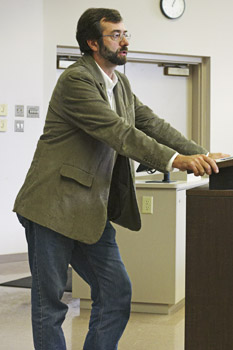by Alex Dimson (from the October Issue of Nexus, Western Law’s Student Newspaper)
It takes business savvy and a tempering of salary goals but ultimately a career in public interest can be highly rewarding, one of Canada’s most famous public interest lawyers told Western law students recently.
In a talk on public interest careers, Murray Klippenstein discussed the challenges he faced trying to build the law firm that bears his name. What made him successful was not his idealism but rather a “focus on the economics of law office management†he said, noting how he carefully manages his firm’s budget.
Klippenstein, best known for his work defending the estate and family of Dudley George, the native rights advocate killed in Ipperwash provincial park in 1997, also discussed the personal challenges of doing public interest advocacy, noting that he makes only a quarter of what his fair market value is.
“I had to ask myself, can I afford to do this?†he said, acknowledging that it was initially a challenge to watch his peers make high salaries, with the rewards of expensive cars and cottages. Looking back, he said he has no regrets. “The answer is I feel great… and I get to go to all [of my law school friend’s] cottages and I don’t have to worry about maintaining them,†he said to laughter from the audience.
Klippenstein said that he was able to find an inner balance by reading the economic literature on happiness, which maintains that personal income has a limited effect on happiness, and he said that he feels ahead of the curve when it comes to achieving a fulfilling life, citing the personal rewards that come from his practice. Pointing to the presence of Dudley George’s brother Sam in the audience, he said that “his happiness comes from helping real people†and that he has built many long-lasting friendship through his practice.
He also discussed other public interest careers – including a career in academia or in government. He said that neither option is ideal, he said, pointing out that while individuals pursuing either career stand to make a solid income of between $120,000-180,000 government lawyers tend to be locked into their career path and are ultimately beholden to the government of the day, which can sometimes put them on a path directly at others with the public.
Professors on the other hand, face the pressure of publishing and there are never any guarantees that their work is helping the public or even being read, he said. In the end, Klippenstein said that no career choice is ideal and the sacrifices a public interest lawyer must make means that it is not for everyone. Ultimately, he said that students will be able to find their own path and he encouraged students who feel up to it to try articling for his firm and some of the other social justice firms out there.

